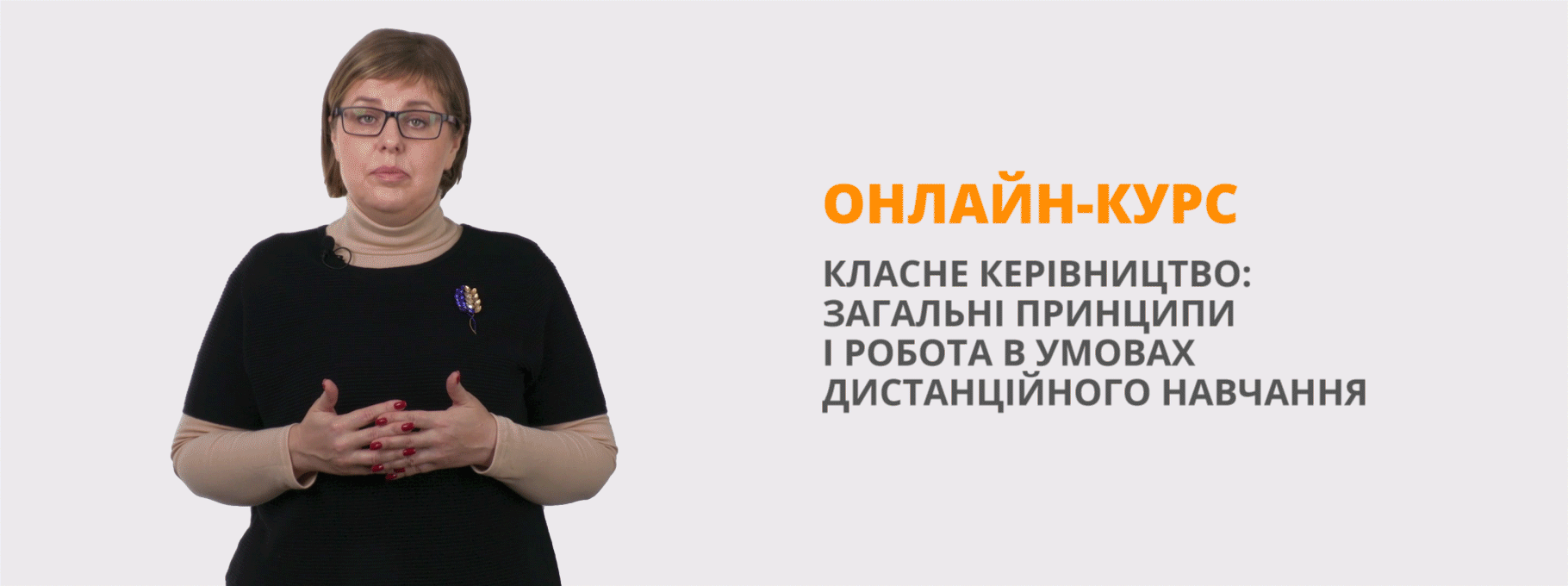Конспект уроку з англійської мови для 11 класу "Problems of youth and their solutions"
План -конспект уроку містить завдання для всіх видів діяльності: письма, аудіювання, читання та говоріння, а також посилання на інтерактивні вправи.
Міністерство освіти і науки України
Департамент освіти і науки
Сумської обласної державної адміністрації
Державний професійно-технічний навчальний заклад
«Конотопське вище професійне училище»
РОЗРОБКА УРОКУ
з англійської мови
Problems of youth and their solutions
Підготувала:
викладач англійської мови
Євгенія САВЕЛА
2022 рік
Тема: Problems of youth and their solutions.
Мета:
Освітня: навчити учнів вживати лексичні одиниці теми в усному та писемному мовленні, удосконалювати навички говоріння, поглибити знання учнів про найпоширеніші проблеми молоді та способи вирішення цих проблем.
Розвивальна: розвивати навички читання, використовуючи лексичні одиниці з теми, розвивати здатність виражати власну думку з теми, розвиток умінь збору інформації та її аналізу.
Виховна: виховувати співчуття, вміння співпереживати, контролювати емоції та бути здатним вирішувати проблеми молоді.
Тип уроку: комбінований
Міжпредметна інтеграція: людина і світ, безпека життєдіяльності.
Наскрізні змістовні лінії: «Громадянська відповідальність», «Здоров’я і безпека».
Методичне забезпечення:
наочність: відеофільм;
роздатковий матеріал, підручник О. Д. Карп’юк «English» 11 клас, картки для письма, читання, говоріння, словники.
Обладнання: комп’ютер, підключений до мережі Інтернет та електронні гаджети для учнів, проєктор.
Хід уроку
І. Підготовка до сприйняття іншомовного мовлення
1. Greeting. Привітання
Teacher (T): Good morning to everyone. Welcome to our English class. I am glad to see you.
Pupils (Ps): We are glad to see you too.
2. Aim. Повідомлення теми та мети уроку.
T: At this lesson we will continue speaking about youth (teenagers). Youth is very important period in the life of a man. This is a time when a person discovers the world and tries to determine their place in the universe. Today we will speak about the problems of teenagers. Of course, at the end of the lesson we will combine the information we have seen and read, analyze it and find out our own solutions to the problems of youth. So, the theme of our lesson is – “Problems of youth and their solutions”.
3. Check on homework. Перевірка домашнього завдання.
T: What was the homework for today?
P: Ex 2,3, page 209.
T: So, let’s check it. Follow the instructions given in the exercise.
4. Warming up. Уведення в іншомовну атмосферу.
T: Tell me please, what associations do you have with the word “youth” or “teenager”?
(Учні отримують посилання на інтерактивну дошку Jamboard та розміщують на ній свої асоціації)
![]() https://jamboard.google.com/d/1g0WJne-xDq2U90By1E_KDWRLxt2EjAlzt5Jh_M_Npk4/viewer?f=0
https://jamboard.google.com/d/1g0WJne-xDq2U90By1E_KDWRLxt2EjAlzt5Jh_M_Npk4/viewer?f=0
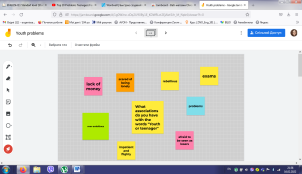
ІІ. Основна частина уроку
1. Listening. Аудіювання.
1.1. Pre-watching task. Активізація лексичних одиниць теми.
T: What problems do young people have?
P: Problems with parents and friends.
P: Lack of money.
T: You are completely right. Let’s practise our vocabulary using an interesting interacting exercise. You should find out the pairs of the word combinations.
( Учні переходять за посиланням та поєднують пари слів у словосполучення)
![]() https://wordwall.net/ru/resource/28925978
https://wordwall.net/ru/resource/28925978
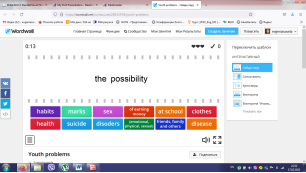
T: Excellent work. Now write down new word combinations into your vocabularies.
1.2. Watching the video. Перегляд відеофрагменту.
T: Now you will watch the video about youth problems. Try to remember as many items as you can. You can make notes while watching.
![]() https://www.youtube.com/watch?v=ZJ-C3urbTfI
https://www.youtube.com/watch?v=ZJ-C3urbTfI
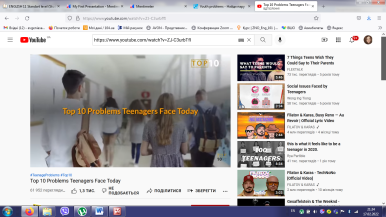
1.3. After-watching task. Завдання на розуміння змісту переглянутого.
T: I hope you’ve got the gist of it. Now let’s play. Your task is to choose the propriet word.
( Учні переходять за посиланням та обирають слово, яке підходить по змісту речення)
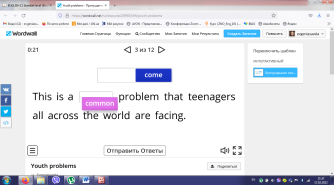
2. Writing. Розвиток навичок писемного мовлення. Individual work with cards.
T: Fill in the gaps in sentences and write them. Be attentive.
|
politics, part-time, problems, spots, boring, money, chore, appearance, guy, drugs, grades, hours, semester I am a teenager so my life isn’t easy. I have many (1)_______. My parents want me to get good (2)_______ at school. But I have so many subjects at school and some of them are extremely (3)_______. I have to do much homework and to read many foolish books, while some teachers don’t understand that their subjects are not the most important things in my life. Some of my friends worry a lot about their (4)_______ and their teenage (5)_______ which spoil our lives! I must confess that (6)_______, alcohol and AIDS don’t really bother me or my friends. The same I should say about (7)__________. What we really care about is how to impress a cute (8)_______ or an attractive girl. Of course I, like many other teenagers, have problems with (9)_______. Some of my friends found a (10)_______ job in order to have an opportunity to earn some money. But despite all these problems, the life of a teenager today isn’t a (11)_______, it is still fun. [7]
|
Keys: 1.problems; 2.grades; 3.boring; 4.appearance; 5.spots; 6.drugs; 7.politics; 8.guy; 9.money; 10.part-time;11. chore.
3. Speaking. Розвиток умінь мовлення. Method “Microphone”
T: So, well done! Now, let’s discuss the text you’ve written. We’ll have a kind of interview. I have an imaginary microphone in my hand and you should answer my questions.

- What problems does the boy have?
- How can you help him?
- Do you have the same problems?
- Do you have a lot of problems? How do you try to solve them?
- Do you ask anybody for advice? Do you talk about your problems
with other people?
- What kinds of problems do your classmates usually have?
- Have you ever solved somebody else’s problem?
- Have you ever written to an advice column? Do you often read
the advice columns in magazines? What can you learn from the
answers? Are all problems of equal importance?
4. Reading. Подання тексту для читання
4.1. Pre-reading task. Постановка завдання перед читанням тексту
T: We have seen and discussed a lot of hardships in teen’s lives. But what do the resent researches show us? In what way are today’s young people different from those of the same age 10 or 15 years ago? You will know if you read the article. Before skimming reading try to catch the general idea of the text.
4.1.1. Skimming reading. Оглядове читання
T: So what is the main idea of the article?
P: Today's teenagers are increasingly suffering from emotional problems.
T: Yes, you are absolutely right.
4.2. Scanning reading. Читання з повним розумінням змісту прочитаного.
|
Today's youth: anxious, depressed, anti-social [2] The mental health of teenagers has sharply declined in the last 25 years and the chances that 15-year-olds ___________ (1) such as lying, stealing and being disobedient, have more than doubled. The rate of emotional problems ___________ (2) has increased by 70% among adolescents, according to the biggest time trend study conducted in Britain. Boys are more likely to exhibit behavioural problems and girls are more likely__________ (3). The rate is higher for emotional problems, now running at one in five of 15-year-old girls. The study found no increase in aggressive behaviour, such as fighting and bullying, and no increase in rates of hyperactivity. The study looked at three generations of 15-year-olds, in 1974, 1986 and 1999. Behavioural problems increased over the whole period, while emotional problems were stable until 1986 and have subsequently shot up. The increases cannot be explained by_____________ (4), argues the team of researchers, because they found comparable increases in all types of families, although there is a higher rate of adolescent mental health problems in single-parent families. Nor can growing inequality over the 25 years explain the rise in problem teenagers because rates of increase were comparable in all social classes. There was no difference between white and ethnic minority teenagers. The research found that the rising rate of 15-year-olds with behavioural problems correlated to their increased chances of experiencing a range of poor outcomes as adults, such as homelessness, being sacked, dependency on benefits and _____________ (5). This indicated that the rise in problems cannot be attributed to a greater likelihood to report them. The deterioration of adolescents' mental health in Britain is in contrast to the findings of research in the US which showed that a comparable decline tailed off in the 90s, while in Holland, there was no decline at all. The study was not focused on the most serious cases such as suicide and self-harm where other recent studies have shown significant increases, but the more general experience of adolescents which is less likely to reach the point of needing professional intervention. The findings are likely to fuel debates about how we are raising our children and whether they reflect parenting in early years or are linked to Britain's secondary education system with its emphasis on academic achievement, and poor record of out of school activities. A recent survey showed that ____________ (6) comes ahead of funding as parents' greatest concern.
A to suffer from emotional problems B discipline in secondary schools C will have behavioural problems D like another one E the rise in divorce and single parenthood F poor mental and physical health G being overworked at school H such as anxiety and depression
|
4.3. After-reading task. Завдання на перевірку розуміння змісту прочитаного.
T: Let us check if you understood all the details of the text. Choose from (A–H) the one which best fits each space (1-6). There are two choices you do not need to use. What’s missing in the first gap?
P: Variant C.
T: That’s right.
5. Work in groups. Робота в групах.
T: Read the situation and discuss the problems. Give your opinion on the suggested solutions and results. [1]
Hundreds and hundreds of teenagers regularly go out at the weekend.
They spend their time in discos, talking to friends, smoking, drinking, etc.
We all see them in the early morning hours, some of them barely
able to walk. Binge drinking is obviously becoming a serious problem
among teenagers. What might be done about it?
|
PROBLEMS |
SOLUTIONS |
RESULTS |
|
The law on the sales |
Strict implementation of the law, high fines for offenders. |
Alcohol not sold to |
|
The working hours of |
Change the working hours, make them more suitable for minors. |
Teenagers would |
|
The youngsters are |
Different working hours |
Healthier lifestyle for |
|
Wrong role models. |
Provide new models, |
Different models |
|
Lack of information |
Parents talking to |
Teenagers aware of |
ІІІ. Заключна частина уроку
1. Self-check. Рефлексія
T: We have done a lot of work today. Let’s check your mood. Continue the phrase – The lesson was…
- Interesting
- Boring
- Confusing
- Difficult
(Учні переходять за посиланням або сканують QR-код і голосують у додатку Mentimeter)
![]() https://www.menti.com/86gyn64k8t
https://www.menti.com/86gyn64k8t

T: Thank you for your honest answers.
2. Summarizing. Підведення підсумків уроку. Бесіда в режимі T-P1-P2.
T: What topic did we start discussing today? What did we read about? What new words and word combinations have you learned? What material was difficult/ interesting/boring? So, you all see where you need more practice and what you can do well.
3. Setting homework. Постановка домашнього завдання
T: Your home task is to write a problem solution essay on the following topic “Nowadays, teenagers often behave anti-socially. What are the reasons and solutions of this problem?” Use your notes from class!
4. Ending. Прощання
T: Good bye! I want to see you ready with your essays for the next lesson. Have a nice day.
Ps: Good bye!
Список використаних джерел
1. Підручник О. Д. Карп’юк «English» 11 клас, Астон, Тернопіль, 2019 рік.
2. https://www.theguardian.com/society/2004/sep/13/childrensservices.mentalhealth)
3. https://jamboard.google.com/d/1g0WJne-xDq2U90By1E_KDWRLxt2EjAlzt5Jh_M_Npk4/viewer?f=0
4. https://wordwall.net/ru/resource/28925978
5. https://www.youtube.com/watch?v=ZJ-C3urbTfI
6. https://www.menti.com/86gyn64k8t


про публікацію авторської розробки
Додати розробку
